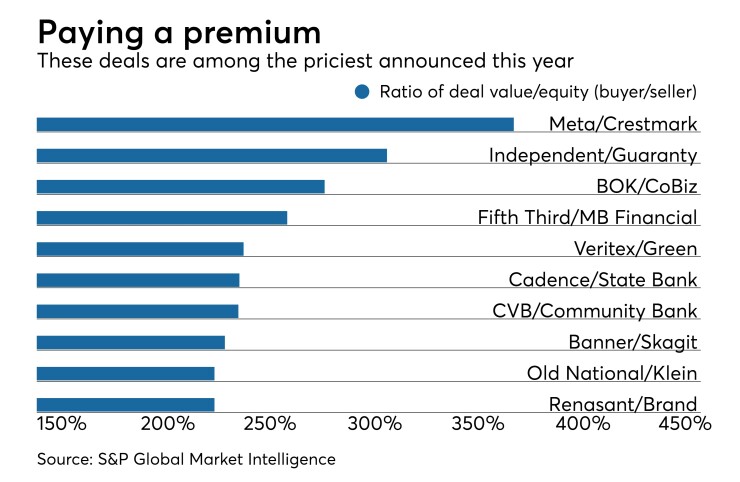When the Kleins voted to sell their bank, it wasn’t liquefying just any asset — the institution had been in the family’s control for nearly a century. As a result, the owners went to great lengths to pick the right deal.
The $2.2 billion-asset Klein Financial
Klein, the holding company for KleinBank, has been owned by the same family since 1907, when C.H. Klein bought First National Bank of Chaska, which is in the greater Minneapolis-St. Paul area. The bank was run solely by the family until 2009, when Doug Hile was hired as president and CEO.

The family began to seriously consider a sale in October when it brought in an investment bank to discuss the operating environment, including what a seller might pay for the bank, according to a recent
The Klein family officially voted to sell the bank at a Jan. 22 shareholder meeting, with two-thirds of shares backing a sale. The next day, the company’s board created an executive committee — consisting of Daniel Klein, the bank’s chairman, and James and Alan Klein, who each served as a vice chairman — that was empowered to act on behalf of the entire board.
The board also decided to create transaction bonuses for executives who were not part of the family and, as a result, would not benefit directly from the company’s sale. Directors also decided to create a retention bonus pool.
To focus more on finding a buyer, Hile suggested that he relinquish his title as bank president. Matthew Klein was appointed to succeed Hile as president.
By early March, Klein’s investment bank had put together a list of 10 potential acquirers, equally divided between “A-list candidates,” including Old National, with the greatest potential for paying an attractive price, and “B-list candidates” that would still be considered. Top-tier banks were immediately given an opportunity to bid, while the investment bank simply gauged interest from the other candidates.
Seven banks entered into confidentiality agreements, though only four candidates — all on the A list — provided indications of interest before May 1. The filing did not disclose any offer prices. Klein’s board invited each bank to complete due diligence and submit a final, nonbinding offer.
Around this time, Klein addressed a major impediment to selling when it
Klein executives in May visited the corporate offices of each suitor “to give management an understanding of the cultural fit of each candidate and integration-related topics,” the filing said. After this stage, one of the banks withdrew from the process.
Klein’s investment bank provided the remaining three banks with a merger agreement, with each having the opportunity to recommend changes and additions to the document.
Old National by late May was able to distinguish itself from the other two suitors. Its $419 million, all-stock offer had the highest aggregate consideration. Management was comfortable with the culture at Old National, which also proposed a more generous severance plan and retention bonus pool than those proposed by Klein.
Old National had an attractive dividend and it “provided the most complete markup of the form merger agreement, leaving less to be negotiated … to finalize the definitive merger agreement,” the filing said.
After conducting more due diligence, Old National on June 16 lowered the proposed exchange ratio by 2.1% — to 7.86 shares of its common stock for each Klein share — to account for 2017 tax dividends and the recalculation of certain post-closing payments to Klein employees. The banks finally settled on a 7.92 exchange ratio, which was 1.4% lower than what was proposed in the original offer.
Klein’s board unanimously approved the sale at a June 20 meeting. The deal, announced the next day and expected to close in the fourth quarter, priced Klein at 236% of its tangible book value. It will provide Old National with the fifth-biggest deposit market share in Minneapolis.
“We look forward to continuing the legacy of exceptional client service and strong community engagement that has defined KleinBank for more than 110 years and four generations,” Bob Jones, Old National’s chairman and CEO, said in a press release announcing the deal. “We believe the enhanced scale, product capability, and market coverage that this combination creates positions us exceptionally well in the Twin Cities.”
Old National expects the deal to be 6.2% accretive to its 2020 earnings per share, including cost savings. It should take less than four years to earn back the projected 3.4% dilution to Old National’s tangible book value.
Old National plans to cut about 40% of KleinBank's annual noninterest expenses, or $22.5 million. The company expects to incur $40.3 million in merger-related expenses.
Several Klein executives are set to receive large payouts tied to the sale as a result of the transaction bonuses set up by the companies.
Hile will receive $3.5 million, including $1.5 million for helping secure a high price for the bank. The executive was eligible to receive a variable bonus equal to 2% of the amount by which the price exceeded $350 million.
Ronald Seib, Klein’s chief operating officer, will receive $750,000, while Kevin Valois, its chief financial officer, will get $500,000. NanciAnn Olson, the bank’s chief administration officer, will receive $200,000.
The filing also disclosed the Old National and Matthew Klein, who has a 33% stake in Klein when taking into account a family trust, are in talks about an employment agreement.





